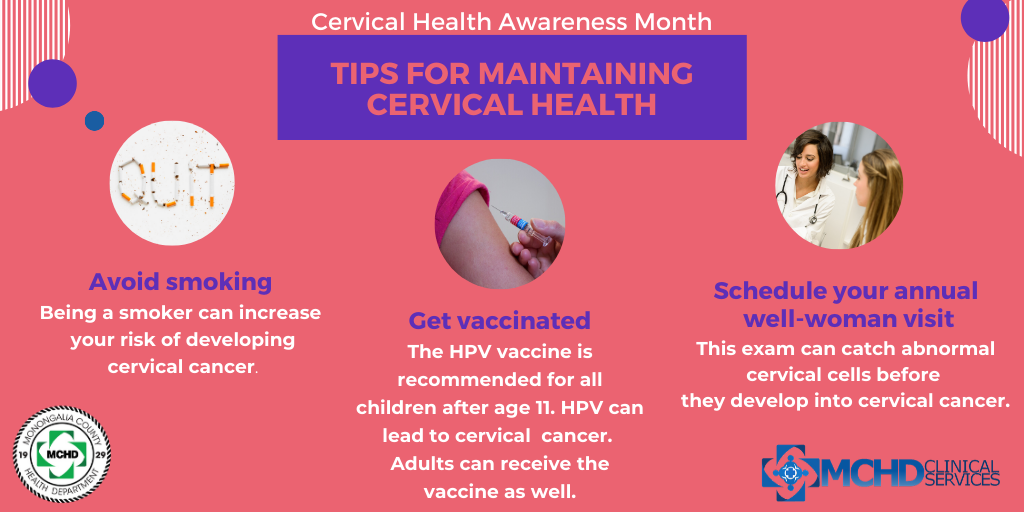The importance of cervical health

Jan. 29, 2020
By Kenzie Bostick
Most people these days know the importance of keeping up with your vaccines. One very important one is the human papillomavirus (HPV) vaccine. This vaccine can help prevent not only HPV, but cervical cancer, too.
As January’s Cervical Health Awareness Month comes to a close, it’s a great time to talk about cervical health.
Cervical cancer is cancer of the cervix. The cervix is what connects the uterus to the vagina. Cervical cancer is caused by certain types of HPV, which is spread through sexual contact. Sometimes HPV can go away on its own, but if it does not, it can cause cancer.
It is very important to get screened for cervical cancer before you show any symptoms. This can help find cells that are abnormal or show signs of HPV before they turn into cancer. Cervical cancer can be tested by pap smears and HPV tests.
How often you should be tested for cervical cancer and HPV depends on your age. From ages 21 to 29, you should be getting a pap smear every three years. After you reach 30-65 years old, you have the option to get a pap test every three years, an HPV test every five years, or get both tests every five years. The option that is best for you depends on your past test results and other factors. Some women may need tested more often than others.
You are more likely to develop cervical cancer if you have HIV, are a smoker, or use birth control pills for more than five years. There is also an increased risk if you have several sexual partners or have given birth three or more times.
You can lower your risk of contracting HPV and cervical cancer by being proactive with your health. Beginning as early as age 9, both girls and boys can get the HPV vaccine, which consists of two shots that are six months to a year apart. You can get the vaccine after this age, but it is more effective if received at the recommended age of 11 or 12.
Adult women should make sure to visit a doctor annually for a well-woman visit. The goals of a well-woman visit consist of a physical exam, learning about your health history and habits and setting health goals. You can prepare for this by learning about your family health history and making a list of topics and questions to discuss with your doctor. Cervical cancer is most commonly found among women who have not had annual check-ups.
It is also helpful to use condoms and limit your number of sexual partners. Using condoms correctly for each encounter is especially important. Avoiding smoking can help prevent HPV and cervical cancer as well, because smoking lowers your immune system’s ability to fight the infection. You should also be careful about how much you drink and in what situations. Alcohol lowers inhibitions, prompting people to make choices that they otherwise wouldn’t.
According to the National Cancer Institute, the HPV vaccine decreased the number of HPV 16 and 18 infections — the strains that cause cervical cancer — by 83 percent in girls aged 15-19 years old. Infection rates among women aged 20-24 decreased by 66 percent.
According to the Centers for Disease Control and Prevention, there are often no symptoms of cervical cancer until it is advanced, and even then, the only symptom may be abnormal discharge or bleeding. If you experience this, see a doctor as soon as possible.
If you are diagnosed with cervical cancer, there is treatment available. The treatment plan is determined by the size of the cancer or how far it has spread. Cervical cancer is typically treated with surgery, chemotherapy, radiation or a combination of those procedures.
Monongalia County Health Department’s Clinical Services offers exams, including the Pap test. We also offer the HPV vaccine. For more information or to make an appointment, call 304-598-5119.
Kenzie Bostick is an intern in the public information office at Monongalia County Health Department.